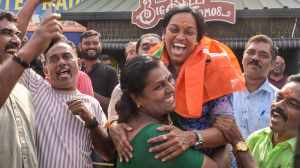Take a look at the essential concepts, terms, and phenomena from the static and current parts of the UPSC-CSE. The Post Read Q&A will help you to self-evaluate your retention memory after reading the article.

Subject/Topic: Security Issues, International organizations
Relevance: Recently, Interpol has been in news from India’s context due to several reasons. Most importantly, Interpol General Assembly in India has caught a lot of attention. This organization is essential for understanding global policing. Relevant for GS II and III. We go Beyond the word to list key highlights from PM’s speech in the 90th general assembly. It has some relevant points to quote from India’s perspective. In the end, we pick up some important points from Anil Sinha’s (former Director, CBI) column in The Indian Express to answer a potential question for UPSC-Why Interpol needs to get better at countering global challenges?
Why in news?
—The Prime Minister, Shri Narendra Modi addressed the 90th Interpol General Assembly in Pragati Maidan, New Delhi.
According to PIB,
The 90th General Assembly of Interpol is being held from the 18th to the 21st of October. The meeting is being attended by delegations from 195 Interpol member countries comprising ministers, police chiefs of countries, heads of national central bureaus, and senior police officers. The General Assembly is Interpol’s supreme governing body and meets once a year to take key decisions related to its functioning.
The Interpol General Assembly meeting is taking place in India after a gap of about 25 years – it was last held in 1997. India’s proposal to host the Interpol’s General Assembly in 2022 at New Delhi coinciding with celebrations for the 75th year of India’s independence was accepted by the General Assembly with an overwhelming majority. The event provides an opportunity to showcase best practices in India’s law and order system to the entire world.
—Earlier, Interpol has rejected a second request by India to issue a Red Corner Notice against Gurpatwant Singh Pannun, the Canada-based founder and legal advisor of the pro-Khalistan outfit Sikhs for Justice (SFJ), whom the Union Ministry of Home Affairs has listed as a “terrorist” under the Unlawful Activities (Prevention) Act (UAPA).
What is Interpol?
— The Interpol, or International Criminal Police Organization, established in 1923, is an inter-governmental organisation comprising 195 member countries, which helps police forces in all these countries to better coordinate their actions.
Story continues below this ad
— According to the Interpol website, the organisation enables member countries to share and access data on crimes and criminals, and offers a range of technical and operational support.
— The Interpol general secretariat coordinates the organisation’s day-to-day activities. It is run by a secretary-general (currently Jurgen Stock of Germany, who has been Interpol’s chief executive since 2014), with its headquarters in Lyon, France, with a global complex for innovation in Singapore, and several satellite offices in different regions.
— Interpol has a National Central Bureau (NCB) in each member country, which is the central point of contact for both the general secretariat and the other NCBs around the world. Each NCB is run by police officials of that country, and usually sits in the government ministry responsible for policing. (Home Ministry in India.)
—The Central Bureau of Investigation (CBI) in India is officially designated single point of contact for liaison with the Interpol.
Story continues below this ad
— Interpol manages 19 police databases with information on crimes and criminals (from names and fingerprints to stolen passports), accessible in real-time to countries. It also offers iwnvestigative support such as forensics, analysis, and assistance in locating fugitives around the world, according to the Interpol website.
What are Interpol notices?
—Interpol notices are international requests made by memeber countries for cooperation or alerts allowing police in member countries to share critical crime-related information.
—Note that such notices can also be used by the United Nations, International Criminal Tribunals and the International Criminal Court to seek persons wanted for committing crimes within their jurisdiction.
The notices are:
Red Notice- To seek the location/arrest of a person wanted by a judicial jurisdiction or an international tribunal with a view to his/her extradition.
Story continues below this ad
Green Notice- To warn about a person’s criminal activities if that person is considered to be a possible threat to public safety.
Blue Notice- To locate, identify or obtain information on a person of interest in a criminal investigation.
Yellow Notice-To locate a missing person or to identify a person unable to identify himself/herself.
Black Notice- To seek information on unidentified bodies.
Orange Notice- To warn of an event, a person, an object or a process representing an imminent threat and danger to persons or property.
Story continues below this ad
Purple Notice- To provide information on modus operandi, procedures, objects, devices, or hiding places used by criminals.
Interpol UNSC Special Notice- To inform Interpol’s members that an individual or an entity is subject to UN sanctions.
What are Global Policing Goals ?
—Seven Global Policing Goals reflect Interpol’s priorities against criminal and terrorist threats, in alignment with the United Nations 2030 Agenda for Sustainable Development.
—Goal 16 (SDG 16) “Peace, Justice and Strong Institutions”: sets targets to reduce all forms of violence, to curtail arms trafficking and to fight organized crime.
Goal 1: Counter the threat of terrorism
Goal 2: Promote border integrity worldwide
Goal 3: Protect vulnerable communities
Goal 4: Secure cyberspace for people and businesses
Story continues below this ad
Goal 5: Promote global integrity
Goal 6: Curb illicit markets
Goal 7: Support environmental security and sustainability
What else you should know?
—A service called I-24/7 is operated by the Interpol which is a Global Police Communications System that provides a common platform for the member countries’ police organisations to share sensitive and urgent police information with each other. It links law enforcement agencies of the member countries.
—India’s Central Bureau of Investigation has joined the Interpol’s International Child Sexual Exploitation (ICSE) initiative that will allow it to collaborate with investigators in other countries for detecting child sex abuse online and identifying abusers, victims, and crime scenes from audio-visual clips using specialised software.
Beyond the word
What are the key takeaways from Prime Minister, Shri Narendra Modi’s address at the 90th Interpol General Assembly in New Delhi?
Story continues below this ad
—The Prime Minister highlighted the connection of Interpol philosophy with Indian culture and underlined the similarity between the INTERPOL’s motto of ‘Connecting Police with a Safer World’ with quote from the Vedas stating “Aano Bhadra Krtavo Yantu Vishwatah” i.e. let noble thoughts come from all directions, which, he elaborated that it is a call for universal cooperation to make the world a better place.
—Remarking on the unique global outlook of India, the Prime Minister highlighted that India is one of the top contributors in sending brave men and women to the United Nations Peacekeeping operations. Shri Modi said, “We made sacrifices to make the world a better place even before India got independence.” He further added that thousands of Indians have sacrificed their lives in world wars.
—Talking about Covid vaccines and climate targets, the Prime Minister informed that India has shown a willingness to take the lead in any kind of crisis. “At a time when nations and societies are becoming inward-looking, India calls for more international cooperation. Global cooperation for local welfare is our call”, Shri Modi added.
—Urging the Interpol to speed up the process of issuing Red Notice against fugitive offenders, Prime Minister Narendra Modi Tuesday said “there can be no safe havens for the corrupt, terrorists, drug cartels, poaching gangs or organised crime”.
Story continues below this ad
“Despite all the past successes, today, I want to remind the world about a few things. There are many harmful globalised threats that the world faces. Terrorism, corruption, drug trafficking, poaching and organised crime. The pace of change of these dangers is faster than earlier. When threats are global, the response cannot be just local. It is high time that the world comes together to defeat these threats”, said PM.
—He said India had been combating trans-national terrorism for several decades, long before the world woke up to the threat. He also spoke on going after the corrupt and called corruption a “dangerous threat”.
“Corruption and financial crimes have harmed the welfare of the citizens of many countries. The corrupt find a way to park the proceeds of crime in different parts of the world… This is one of the major sources of terror funding.”
—“From illegal drugs that destroy young lives to human trafficking, from weakening democracies to the sale of illegal arms, this dirty money funds many destructive enterprises. Yes, there are diverse legal and procedural frameworks to deal with them. However, there is a need for the global community to work even faster to eliminate safe havens,” he said.
—Underlining that a safe and secure world is shared responsibility, Modi said, “It is no longer enough that terrorism is fought only in the physical space. It is now spreading its presence through online radicalisation and cyber threats. At the click of a button, an attack can be executed or systems can be brought to their knees. Each nation is working on strategies against them. But what we do within our borders is no longer enough.”
—“There is a need to further develop international strategies. Establishment of early detection and warning systems, protecting transportation services, security for communication infrastructure, security for critical infrastructure, technical and technological assistance, intelligence exchange, many of these things need to be taken to a new level,” he said.
—Extolling the virtues of India’s democracy and its diversity, Modi said Indian police have a tough task implementing more than 900 national and around 10,000 state laws.
—He said Indian festivals, such as the Kumbh Mela, attract millions of pilgrims where police have to maintain order. “With all this, our police forces work while respecting the diversity and rights of the people promised by the Constitution. They not only protect the people but also serve our democracy.”
—“Take the scale of India’s free, fair and massive elections. Elections involve arrangements for around 900 million electors. This is close to the population of North and South American continents taken together. About 2.3 million police personnel are deployed to help with the elections. In upholding diversity and democracy, India is a case study for the world,” he said.
Anil Sinha former Director, CBI and former head, National Central Bureau of India for Interpol writing for The Indian Express highlights some essential points with respect to the Interpol.
—The areas of concern are growing and find resonance all over the world — from human trafficking to disturbing instances of financial crimes by the high and mighty, safe haven provided to fugitives accused of terrorism and money laundering and the proliferation of illicit trade based on counterfeiting and smuggling. Transnational organised crime continues to thrive due to illicit networks that operate on the strength of money laundering. The complex intertwined structure of crimes funding terrorism across the globe is not yet demolished.
—Providing information about crime and criminals in the digital space, preventing abuse of cyberspace and stalling hackers on the dark web are areas where Interpol’s global security architecture is used.
—It has undertaken various operations in different countries relating to the trafficking of women and children, cyber crimes, online piracy, spurious pharmaceuticals, narcotics smuggling, illegal gun trade, missing persons, stolen and lost travel documents.
—Interpol, however, is required now to articulate an expansion beyond its databases and tools. The success of its secure i-24 for 24/7 information sharing aside, the importance of real-time dissemination of information obtained through unbiased usage of data analytics as a crucial imperative of emerging challenges should gain primacy. Equitable significance should be accorded to the legitimate interests of growing economies pursuing democratic charters.
—In its composition, Interpol is like the UN. But it is not meant for dispute resolution. It is designed to assist the police forces of member nations. Interpol is neither an investigative agency like the CBI nor a front-line police force. It is mandated to share information and provide back-end technical assistance to law enforcement agencies. Interpol action against notorious fugitives is consequential upon commensurate action from member nations where the fugitives might be seeking shelter. Interpol cannot act on its own. The desired legal course of action depends on bilateral arrangements like mutual legal assistance treaties.
—Interpol will turn 100 next year. Now is the time to calibrate to counter emergent challenges. Policing is not merely a process for maintaining the rule of law through deterrent punitive measures against crime and criminals. Public-spirited efficient policing is the most meaningful confidence-building measure that people across diverse geopolitical contours desire and deserve.
—Interpol and law enforcement agencies of member nations must endeavour to build, maintain and operate a people-centric ecosystem to meet the evolving challenges.
Point to ponder: Technology can make policing better — and also more dangerous. Discuss.
MCQ:
Which of the followings are not correctly matched with respect to Interpol notices?
a) Red Notice- To seek the location/arrest of a person wanted by a judicial jurisdiction or an international tribunal with a view to his/her extradition.
b) Green Notice- To warn about a person’s criminal activities if that person is considered to be a possible threat to public safety.
c) Blue Notice- To provide information on modus operandi, procedures, objects, devices, or hiding places used by criminals.
d) Yellow Notice-To locate a missing person or to identify a person unable to identify himself/herself.
Post Read Q&A
Can you recall what you read?
1. What are global policing goals?
2. What is the connection of Interpol philosophy with Indian culture?
3. What are new global challenges that interpol should concentrate upon?
(Sources: interpol.int, pib.gov.in)


































